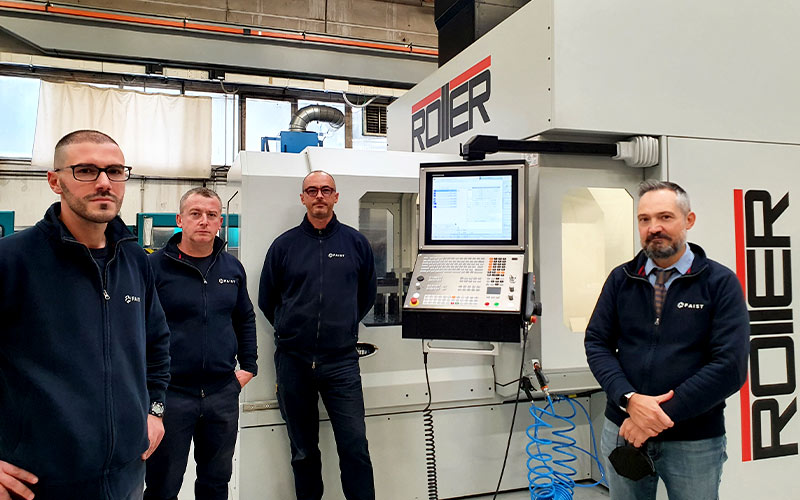
First of all, present yourself, your experience and your role in the company. What does your job involve?
My name is Alessandro Starnini and since October 2020 I am in charge of the internal tooling production in FAIST Componenti, as Tool Shop Manager.
My previous experiences have been in the construction of sheet metal tooling and in stamping and assembly in Automotive companies. Before starting this new adventure, in FAIST I was a Key Account Manager following, through the years, both automotive clients and customers working in other industries.
Translating a design into prototype and production tooling – how is it done for stamped parts?
I will try to describe in a simple way the tooling department’s macro-activities typical flow: upon receipt of a request for quotation coming from the commercial structure, the tooling department begins, together with our Manufacturing, the analysis of the manufacturing cycles and the feasibility of the components made by sheet metal stamping, going in depth in what could be critical in the process and the tool, its type and costs. If necessary, a preliminary study of formability is carried out through FEM analysis, extremely useful in terms of accuracy for the raw material requirement and for any design change that might need to be submitted to the customer.
Whenever possible, the following production of prototypes and the related soft tools is developed inside, for lesson-learning purpose with a focus on the subsequent mass production.
From the prototype stage, we move on to the tool production stage, which involves a more in-depth analysis and subsequent design of the definitive equipment. The Manufacturing team has experienced professionals with expertise in the design of both progressive and transfer sheet metal dies, and in the recent past it has been enriched with important experiences also for the fine blanking process.
Based on the workloads, the design is then carried out and finalized internally or entrusted with specialized firms that have fruitfully collaborated with FAIST for years.
By analysing the project, the hours needed are then allocated in the plans for each specific work centre and the master plan for the implementation of the equipment is drawn up, then shared and discussed with the reference Customer Team.
The progress of the project is later monitored weekly, making all the necessary corrections to avoid missing the milestones.
Besides these activities, we also need to support the Maintenance department to sustain the company’s quality and efficiency standards. This is an element of complexity, having to manage two overlapping flows of activities on a daily basis, where timeliness and flexibility are key elements.
Planning and flexibility therefore have to coexist and be balanced in real time.
How do you foster in the team the intensive and diversified knowledge of engineering and scientific principles needed to perform well?
I currently have the responsibility of organizing the work in the Tool Shop, with a particular focus to the respect of deadlines, the optimization of technological and human resources, and the promotion of growth and improvement in the department from the point of view of efficiency and quality standards.
Professional and technological growth, especially in a time of rapid transformations such as the one we are experiencing, obviously represents a key element to bring a company in the future.
With this in mind, specific training courses are being carried out and planned for the different technologies we have available, also taking into account the innovations related to materials and tools, as well as the inclusion of professionals with an adequate technical profile.
Tell us about the latest addition to the machinery fleet of FAIST CPS & IND Tool Shop.
The company made an important investment with the purchase of a modern 5-axis multifunctional machining centre, a great opportunity for us but also a challenge that will involve a reorganization of the milling department, with the redistribution of tasks and the related adjustment of skills. The new machine, thanks to its high-precision construction feature and the adoption of advanced processing detection systems and control technologies such as the triaxial accelerometer for monitoring vibrations and tool imbalances, a magnetic encoder and thermal probes on the ceramic bearings of the motorized head among others, is able to guarantee processing repeatability with an accuracy of 0,005 mm. The 5 continuous work axes and the high speed of rotation of the motor spindle allow an optimal three-dimensional surface finish, without having to resort to costly and non-repeatable manual polishing operations. The above, together with a more modern and efficient fixing and zeroing system, allows a further drastic reduction of errors related to multiple positioning as well as a significant reduction of the setup time.
What is the perspective of the team directly involved in the daily use of this machine?
They are really motivated. They want to learn everything about this new milling centre, in order to deal at their best with the work and make an additional step in their professional growth. I am very happy that this is the approach they have to the job, and I am confident that the team will continue to grow allowing FAIST’s tool shop to further contribute to the success of the company.



